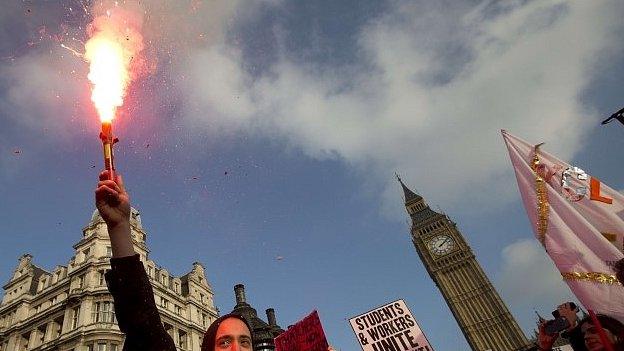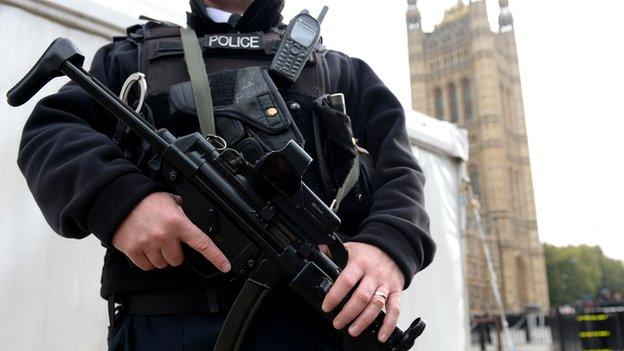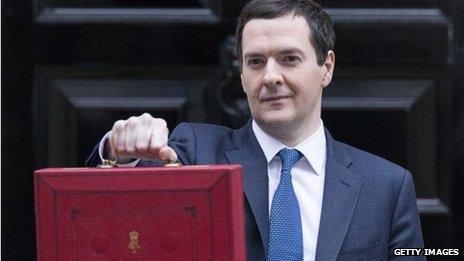Will the public accept the cuts to come?
- Published

Whoever wins the election, more cuts are on their way.
The big Westminster parties agree they must balance the books one way or another by 2020. Achieving that will mean spending less in real terms.
Tony Travers, from the London School of Economics, has calculated how individual services could be affected.
His analysis, shared exclusively with BBC Radio 4's World at One, suggests adult social care could face an 8% cut in real terms funding in the next five years.
Nick Forbes, Labour leader of Newcastle Council, says: "The only big areas of expenditure that local authorities have left are adult and children's social care - and if local authority budgets are squeezed even further in the future, those are the areas where there'll have to be reductions."
Government spending on front-line policing in England could drop by a fifth, according to Travers' calculations, while highways and housing spending by councils could fall by 40%.
The figures were reached by analysing how spending cuts were split from April 2010 until April 2014, and then projecting the same share of cuts forward until April 2019.
Some in government feel they have heard all this before, and seen forecasts of dire consequences proved wrong.
Back in 2010, Nick Clegg imagined the Conservatives governing alone, putting up VAT to 20%, cutting the wage bill in the public sector, and suggested civil unrest could follow.

Spending on the police is down .... but so is crime
Without public consent for a cuts programme, Britain might see Greek-style unrest, he said, conjuring memories of the disorder in southern Europe.
Many of the spending cuts and tax rises anticipated by Clegg came to pass. The unrest did not.
Lib Dems will, of course, credit their influence in government.
Conservatives argue the government simply made a good job of finding savings, and proved it could be done without destroying services or prompting a national drama.
Famously, spending on the police is down, but so too is crime.
Widespread consent?
The local government minister Kris Hopkins noted: "Council tax has fallen by 11% in real terms and public satisfaction with local government has been maintained."
Research suggests the public have accepted many of the savings councils have made so far.
Who would have thought, those in government argue, that you could take some £25bn out of spending on public services with such widespread consent?
There are even councillors who say the cuts have given them an opportunity to do a better job spending taxpayers' money.
Philippa Roe, the Tory leader of Westminster Council, says sharing fostering services with two other London boroughs has both saved money and made it easier to find homes for children.
Yet cutting without causing outrage, can encourage more cuts.
'All hell would break out'
Travers says public acceptance gives the government grounds for comfort and optimism.
"What it means," he says, "is they think: if local government can manage it we'll make it take further cuts. You couldn't do this to the NHS - if you did all hell would break out."
The Institute for Fiscal Studies says we are only half way through the cuts programme needed to achieve Chancellor George Osborne's plans.
Will the public accept even more savings after the election?
Lib Dems are renewing their 2010 concerns, calling post-election Conservative plans unfair and not credible.
Even some Conservatives sound warnings.
At Westminster, Roe says the council has already made easier savings.

Osborne wants to reach a budget surplus by 2018/19
She adds: "I think we are, however, getting to a point where we are perhaps going to have to make some very tough decisions about front-line services that we would, in a normal event want to fund, but actually will not find ourselves being able to fund them."
There is evidence the public at large has little idea more cuts are coming.
A Populus poll for the Financial Times suggested that only two in five voters now believe that more austerity would be needed after the general election.
Perhaps that's because the details of how the parties will meet their targets for the economy are vague.
Chancellor George Osborne wants to reach an overall budget surplus by 2018/19. That is thought to amount to cuts of £47bn in departmental budgets after the election.
No escape
Osborne has explained he would seek £12bn in welfare savings over two years, £3bn of which would come from freezing working age benefits.
It still leaves a lot of money to find, particularly as he wants to hit his goal without raising taxes, and has to find another £7bn to pay for tax-cutting pledges made at the Conservative Party conference.
Labour has a looser target - the shadow chancellor Ed Balls wants to reach a surplus not including capital spending by the end of the next Parliament, and to get debt falling before 2020.
The Institute of Fiscal Studies has suggested Balls could cut just £9.3bn between 2015-16 and 2018-19 if he earmarked all the money his plans could allow to ease cuts in departmental spending. But we don't yet know what decisions he will take.
Balls has signed up to the £8.5bn of departmental cuts planned by this government for 2015/16.
So Labour will not avoid cuts.
Protecting the NHS
It's not only the idea of creating a surplus that appeals to Conservatives, Labour and Liberal Democrats alike. They all think the NHS needs more money.
Travers says: "The NHS, we all understand, has a particular status in Britain.
"It's very popular, and frankly it also has a number of powerful lobbyists who are very capable of making the case for why problems in accident and emergency, problems here, problems there all require additional money, additional staffing and so on."
Lib Dems and Labour have suggested the wealthiest older people should lose the winter fuel allowance, but no one wants to put pensions at risk. The IFS notes we are likely to be spending about £12 billion more on benefits for pensioners in 2018-19 than we did in 2010-11.
If politicians share ideas about creating a surplus, and protecting both the NHS and pensions, they share a quandary too.
They have to do all this while trying to persuade voters, many of whom think austerity a problem for this parliament, to vote for them.
The IFS has suggested there is a "conspiracy of silence" about the details of cuts.
By polling day 2010 George Osborne had made it very clear cuts were coming. If the former prime minister Gordon Brown took a very long time to concede Labour would cut too, the party got there in the end, accepting they would seek tougher and deeper savings than those seen under Margaret Thatcher.
Five months from the next general election politicians aren't, understandably, rushing to spell out every line of their fiscal plans to be demolished by their opponents.
The new government will make its final decisions at a spending review in the new parliament.
But MPs are not yet shouting too loudly about the full scale of the cuts to come.
While the economists and analysts of the Westminster village are aware more austerity lies ahead, it could come as a nasty surprise to the country at large.